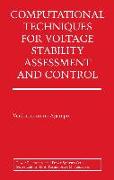- Start
- Computational Techniques for Voltage Stability Assessment and Control
Computational Techniques for Voltage Stability Assessment and Control
Angebote / Angebote:
Voltage stability is a critical issue in the secure operation of the restructured power system. Poor voltage conditions lead not only to voltage collapse in the system but can also induce oscillatory instability that may cause a loss of synchronism. A critical question is how to estimate the distance to voltage instability given the present state of the system.
Computational Techniques for Voltage Stability Assessment and Control brings together in one place the computational tools necessary to compute the voltage stability margin. The basic computational tool for tracing the P-V curve and equilibria tracing is the continuation power flow. This technique as well as the algorithm is explained in detail by the author. Sensitivity of the voltage stability margin to various parameters in the system is discussed extensively both theoretically and in a numerical context.
The key concepts of both saddle node and Hopf bifurcation are covered. These are illustrated with the differential-algebraic equation (DAE) model of the system. The model is complex enough to include Load Tap-Changing transformers as well as HVDC models. The dynamic model of the generating unit includes the exciter since it plays a crucial role in voltage stability. A promising decoupled dynamic simulation technique is introduced for time domain analysis.
Computational Techniques for Voltage Stability Assessment and Control provides the computational tools and algorithms needed for development of on-line voltage security assessment
Folgt in ca. 15 Arbeitstagen
